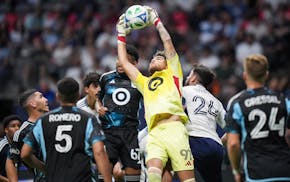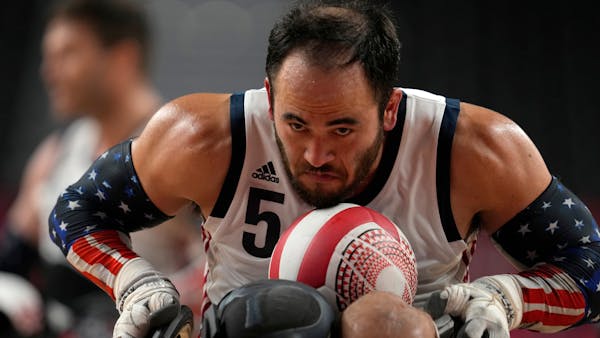To Mallory Weggemann, it wasn't just a name change. In 2019, when the U.S. Olympic Committee became the U.S. Olympic & Paralympic Committee, the swimmer from Eagan viewed it as a major milestone for elite adaptive sports.
The shift brought able-bodied athletes and those with disabilities under the same Team USA umbrella. Better yet, the organization already was backing up that symbolism with cash, voting in 2018 to pay Paralympic and Olympic medalists the same bonuses under its "Operation Gold'' program.
"That's huge,'' Weggemann said. "It's making a statement that we value our Olympians and our Paralympians as equals, as one team. And that is incredibly powerful.''
Two weeks after the Olympians concluded the Tokyo Games, the Paralympians will take their turn in the spotlight, marching into Tokyo's National Stadium on Tuesday to begin the Paralympic Games (live 5:55 a.m. on NBCSN with a replay at 6 p.m.). Two athletes with Minnesota ties — Chuck Aoki and Melissa Stockwell —will carry the American flag in the Opening Ceremony, leading a delegation of 240 U.S. athletes who will compete in the 13-day event.
Aoki, a wheelchair rugby player from Minneapolis, and Stockwell, a triathlete and alumna of Eden Prairie High School, are three-time Paralympians. So is Weggemann, who will swim in six events.
They are bracing for a different kind of experience, as these Games face many of the same challenges as the Tokyo Olympics. The city remains under a COVID-induced state of emergency. Cases continue to surge; last week, daily total cases in Tokyo surpassed 5,000 on four consecutive days for the first time.
Athletes had to contend with a one-year delay, and international fans — including family members — are banned from traveling to Japan. While there is a plan to bring some Japanese schoolchildren into the venues, no other spectators will be permitted.
Yet these Paralympics also offer some firsts of a happier sort. The networks of NBC will show 1,200 hours of coverage via TV and livestream, the most ever, and a record 4,400 athletes will compete. Given that expansion, along with efforts such as the USOPC's name change, Weggemann expects the Tokyo Games to mark another vital step forward for the Paralympic movement and for people with disabilities.
"There has been huge growth in the past decade, which is incredible to see,'' said Weggemann, a two-time Paralympic medalist and 15-time world champion. "But we're still in a growth stage with the Paralympics, and with creating greater representation and equality for our disability community.
"For the USOPC to say we are one team, that transcends the field of play. It brings the conversation of equality to society at large. That's the power of the Paralympic movement.''
The Tokyo Paralympics will include delegations from 161 nations and territories, plus a Refugee Paralympic Team. Five nations will compete for the first time.
The International Paralympic Committee estimates 4.25 billion viewers around the world are likely to watch the Games, surpassing the 4.1 billion who watched the 2016 Rio Games. TV networks from several nations are showing hundreds of hours of coverage. Like NBC, Canada's CBC, Australia's Channel Seven and Great Britain's Channel 4 will broadcast about 1,200 hours of coverage via streaming services and an array of TV channels.
For the first time, NBC will show Paralympics coverage during prime time. More sponsors are getting on board, too; in a news release, NBC said its coverage is funded by "unparalleled corporate support'' from companies such as Nike and Toyota.
Rose Hollermann of Elysian, another three-time Paralympian from Minnesota, said the amount of coverage isn't the only thing that's changed. She also has noticed a shift in the media's approach to Paralympic sport.
"We're seeing less of the inspirational stories, and more about us as athletes,'' Hollermann said. "Instead of focusing on our journey as a disabled person and how we were injured, the focus is on our journey in our sport. That's important. It helps show disabled people as strong and capable. You don't just see the wheelchair.''
The Tokyo Paralympics also will serve as the launch pad for a new global campaign promoting inclusion and equality for people with disabilities. WeThe15 — named for the 15% of the world's population that is living with a disability — is a consortium of international organizations from sports, business, entertainment and other spheres.
Last week, Tokyo's Rainbow Bridge, Minneapolis's Target Field and U.S. Bank Stadium and other places around the world were lit in purple, the campaign's signature color.
Many Paralympians faced unprecedented hurdles during the one-year delay caused by the pandemic. Josh Cinnamo of Lakeville, a world champion in shot put, said he and his fellow Paralympians were well-equipped for such obstacles. "We know how to adapt,'' he said. "It's all we do.''
Weggemann and her husband postponed having a child, and she had to find ways to train when her pool closed. Yet the desire to compete over the next two weeks in Tokyo, for herself and for her community, kept her going.
"I know this movement is only going to continue to grow,'' she said. "Sport is such a powerful tool to change perceptions. I'm so proud to be part of it.''
Paralympics on TV today
Opening Ceremony 6 am NBCSN
Swimming; basketball; rugby; track cycling 9 pm NBCSN
Swimming; rugby; track cycling 2 am (Wed.) NBCSN
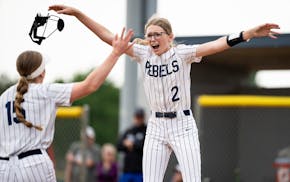
Champlin Park shuts out Rogers 1-0 to win Class 4A, Section 5 softball title

Steady stream of rainouts disrupting St. Paul Saints' season
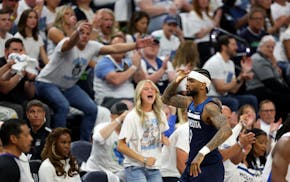
Three key Timberwolves players could enter free agent market
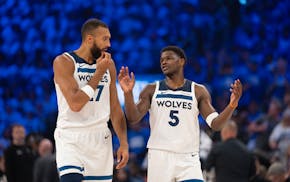
Souhan: If Edwards is a franchise player, he needs to act and play like it
